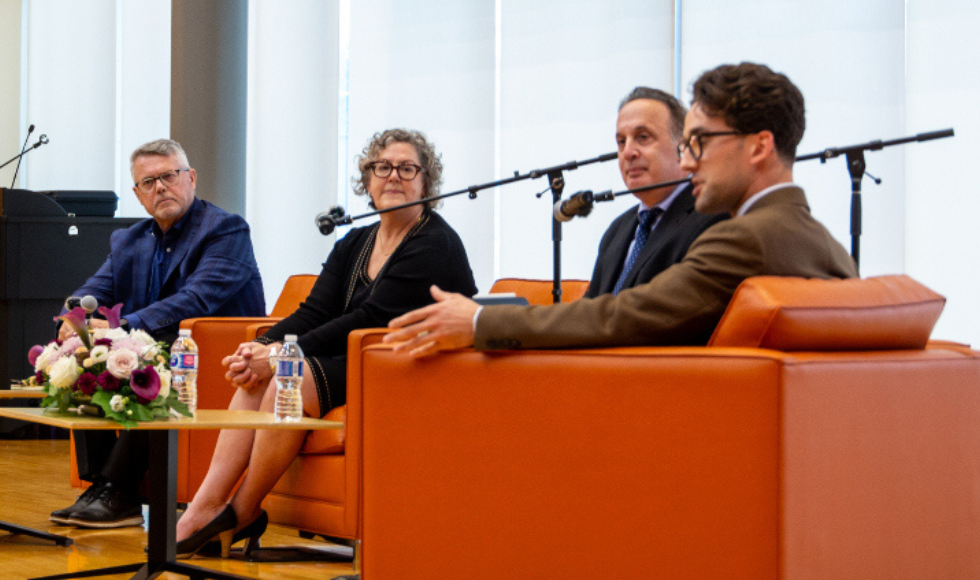Wilson College leads discussion on U.S. election and its impact on Canadians

From left: Panellists Terry Flynn, Karen Bird, Don Abelson and discussion moderator Giancarlo Da-Re. Joined by a sold-out in-person audience and nearly 300 online viewers, the expert panel explored bilateral trade, the role of the media, political integrity and other key topics related to the upcoming U.S. election.
Canadians may not be able to vote in the U.S. election, but that doesn’t mean they’re not concerned about the outcome — and its implications for Canada.
With two weeks to go before Americans cast their vote, Wilson College of Leadership and Civic Engagement at McMaster University hosted a discussion between experts in political science, communications and leadership to explore the election’s impact on Canada-U.S. relations.
Faculty members Don Abelson, Karen Bird and Terry Flynn joined moderator and Wilson College external advisory council member Giancarlo Da-Re, who is the director of policy and stakeholder relations for Ontario’s Solicitor General, for the timely panel discussion.
“One of our key priorities at McMaster is supporting and advancing healthy democracies, good governance, civil society, and effective leadership,” McMaster President David Farrar said as he welcomed the panellists and a sold-out audience of 200. Nearly 300 people signed on to watch the livestream.
“Wilson College is the first learning and research space of its kind in Canada, and will be pivotal in building the next generation of community leaders who are prepared to take on societal challenges with creativity and innovation.”
Audience members were invited to ask questions throughout the panel discussion — voicing concerns about voter fraud, low voter turnout and increasing polarization.
Instability in U.S.-Canada relations
The panellists discussed how the election could affect the U.S.-Canada trade relationship.
“Canadian policy makers are deeply concerned that there will be a disruption in trade, that there will be more tax on trade agreements that have already been signed with the U.S. and Mexico,” Abelson said.
The academic director of Wilson College and a professor of political science at McMaster Abelson appears regularly on media networks in the U.S., Canada and Europe to discuss bilateral relations and policies.
“We need to be more proactive. We need to be more vigilant. We can no longer take for granted that America will always be on our side,” he said.
“We’re dealing with two independent, sovereign countries. At times our interests align nicely and other times they don’t.”
Role of disinformation
“We are part of the American media ecosystem. We get a majority of our news, whether we like it or not, directly through our contact with the U.S. media,” said Flynn, a professor of communications studies with two decades of experience as a communications professional.
A lot of people have been persuaded by the “Big Lie” — that the 2020 election was rigged, agreed Bird, a professor of political science who is involved in the Electoral Integrity Project, in which experts and academics evaluate the integrity of elections worldwide.
“U.S. elections aren’t perfect, and they score lower than Canadian elections on integrity because of the role of money, but they are — and have long been viewed as — generally free and fair,” Bird said.
“In terms of equal access to the ballot, in terms of the process of vote tabulation, in terms of the rule of law that oversees elections, things do work reasonably well in the U.S.”
Polarization and integrity
A question from the audience prompted discussion on how the U.S. election is creating polarization, with an erosion of the moderate middle ground as each side digs in emphatically.
Abelson stressed the importance of character and integrity, rather than political affiliation.
“We have a problem in the U.S. and Canada with politicians seeing the world through the lens of left and right instead of right and wrong,” he said. “We have to get back to a point where we have a general consensus that doing certain things is just dead wrong.”
And Canadian politicians aren’t immune to less-than-civil discourse, Flynn added.
“It also goes back to our Parliamentarians, who are using uncivilized language and tactics,” he said.
“We have to think about party politics – ensuring that the civility begins in the House, so that they role model what we want politicians to be.”
The panel agreed that while the media may portray communities as divided, people are more similar than it might seem.
“The public in the U.S. are not as ideologically polarized as they think they are,” Bird said. “There’s more overlap than they think.”
Wilson College’s role
The event gave the audience an opportunity to learn more about election issues — as well as Wilson College.
“Pure brain food,” said audience member and 1979 McMaster graduate Richard Feenstra. “It was so great to get certain discussion points clarified.”
Hamilton resident Sherry Wang agreed. “I’m really happy to see McMaster has established this kind of institution,” she said. “I appreciate the effort to open this event to the public, to discuss such a timely topic.”
The evening embodied the kind of dynamic, forward-thinking conversation that will define Wilson College, said Jeremiah Hurley, dean of the Faculty of Social Sciences.
“The types of issues that we tackle tonight are the types of challenges that Wilson College students, scholars and partners will engage with in the coming years.”


